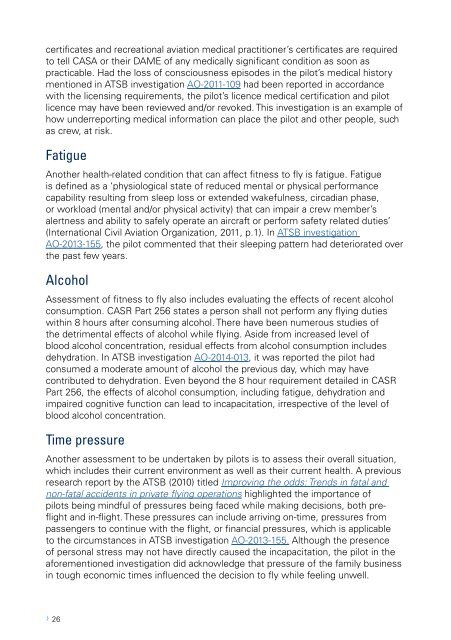Pilot incapacitation occurrences 2010–2014
8rKXy6YKY
8rKXy6YKY
You also want an ePaper? Increase the reach of your titles
YUMPU automatically turns print PDFs into web optimized ePapers that Google loves.
certificates and recreational aviation medical practitioner’s certificates are required<br />
to tell CASA or their DAME of any medically significant condition as soon as<br />
practicable. Had the loss of consciousness episodes in the pilot’s medical history<br />
mentioned in ATSB investigation AO-2011-109 had been reported in accordance<br />
with the licensing requirements, the pilot’s licence medical certification and pilot<br />
licence may have been reviewed and/or revoked. This investigation is an example of<br />
how underreporting medical information can place the pilot and other people, such<br />
as crew, at risk.<br />
Fatigue<br />
Another health-related condition that can affect fitness to fly is fatigue. Fatigue<br />
is defined as a ‘physiological state of reduced mental or physical performance<br />
capability resulting from sleep loss or extended wakefulness, circadian phase,<br />
or workload (mental and/or physical activity) that can impair a crew member’s<br />
alertness and ability to safely operate an aircraft or perform safety related duties’<br />
(International Civil Aviation Organization, 2011, p.1). In ATSB investigation<br />
AO-2013-155, the pilot commented that their sleeping pattern had deteriorated over<br />
the past few years.<br />
Alcohol<br />
Assessment of fitness to fly also includes evaluating the effects of recent alcohol<br />
consumption. CASR Part 256 states a person shall not perform any flying duties<br />
within 8 hours after consuming alcohol. There have been numerous studies of<br />
the detrimental effects of alcohol while flying. Aside from increased level of<br />
blood alcohol concentration, residual effects from alcohol consumption includes<br />
dehydration. In ATSB investigation AO-2014-013, it was reported the pilot had<br />
consumed a moderate amount of alcohol the previous day, which may have<br />
contributed to dehydration. Even beyond the 8 hour requirement detailed in CASR<br />
Part 256, the effects of alcohol consumption, including fatigue, dehydration and<br />
impaired cognitive function can lead to <strong>incapacitation</strong>, irrespective of the level of<br />
blood alcohol concentration.<br />
Time pressure<br />
Another assessment to be undertaken by pilots is to assess their overall situation,<br />
which includes their current environment as well as their current health. A previous<br />
research report by the ATSB (2010) titled Improving the odds: Trends in fatal and<br />
non-fatal accidents in private flying operations highlighted the importance of<br />
pilots being mindful of pressures being faced while making decisions, both preflight<br />
and in-flight. These pressures can include arriving on-time, pressures from<br />
passengers to continue with the flight, or financial pressures, which is applicable<br />
to the circumstances in ATSB investigation AO-2013-155. Although the presence<br />
of personal stress may not have directly caused the <strong>incapacitation</strong>, the pilot in the<br />
aforementioned investigation did acknowledge that pressure of the family business<br />
in tough economic times influenced the decision to fly while feeling unwell.<br />
› 26


